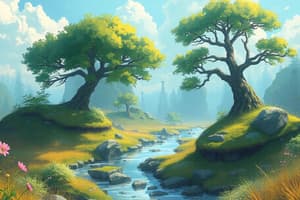Podcast
Questions and Answers
Who coined the term 'Ecology'?
Who coined the term 'Ecology'?
Ernst Haeckel
What does the Greek word 'Oikos' mean?
What does the Greek word 'Oikos' mean?
Home
What is Ecology?
What is Ecology?
The study of the relationships of various organisms in their natural habitat interacting with their surroundings.
What is Autecology?
What is Autecology?
Who first used the term Ecosystem?
Who first used the term Ecosystem?
Which of the following is not a type of Natural Ecosystem?
Which of the following is not a type of Natural Ecosystem?
What are the biotic components of an ecosystem?
What are the biotic components of an ecosystem?
Which type of food chain starts with dead organic matter?
Which type of food chain starts with dead organic matter?
What does a food web represent?
What does a food web represent?
What is depicted in an ecological pyramid?
What is depicted in an ecological pyramid?
Which type of ecological pyramid represents the weight of organisms?
Which type of ecological pyramid represents the weight of organisms?
Flashcards are hidden until you start studying
Study Notes
Introduction to Ecology
- Coined in 1866 by German biologist Ernst Haeckel from Greek words "Oikos" (home) and "Logos" (study).
- Defined as the study of relationships between organisms in their natural habitats and their interactions with surroundings.
Types of Ecology
- Autecology: Focuses on single species/organisms.
- Synecology: Studies groups of multiple species.
Ecosystem Definition
- Introduced by British ecologist Arthur Tansley in 1935.
- The basic structural and functional unit of ecology, comprising biotic communities interacting with a non-living environment.
- Examples include grassland, forest, and aquatic ecosystems.
Classification of Ecosystems
- Natural Ecosystems:
- Aquatic: Freshwater (running and standing), marine.
- Terrestrial: Grassland, forest, desert.
- Artificial/Engineered Ecosystems: Created or modified by human activities.
Components of an Ecosystem
-
Biotic Components:
- Producers: Photo-autotrophs and chemo-autotrophs (e.g., Nitrosomonas, iron bacteria).
- Consumers: Herbivores, carnivores, omnivores, and detritivores.
- Decomposers: Organisms that break down organic matter.
-
Abiotic Components:
- Physical: Climate (sunlight, temperature, humidity, rainfall, wind), soil characteristics (type, moisture, pH), geographic conditions (latitude, longitude, altitude).
- Chemical: Nutrients (macro/micro), trace elements, pollutants.
Functional Components of Ecosystems
-
Food Chain: Linkage of organisms for food energy transfer.
- Grazing Food Chain: Energy starts with plants.
- Detritus Food Chain: Energy starts with decomposed organic matter.
-
Food Web: Interconnected food chains demonstrating energy flow.
-
Trophic Levels: Steps in a food chain where food/energy transfer occurs.
Importance of Food Chains and Webs
- Energy flow and transfer between organisms.
- Regulation of nutrient cycles.
- Maintenance of ecological balance and population sizes.
Ecological Pyramids
-
Visual representation of energy and biomass distribution across trophic levels.
-
Base of the pyramid consists of producers; successively higher levels contain consumers.
-
Types of Ecological Pyramids:
- Pyramid of Numbers: Represents population numbers at each trophic level.
- Pyramid of Biomass: Depicts weight of organisms rather than number.
- Pyramid of Energy: Illustrates energy flow; typically upright in shape.
Energy Flow in the Environment
- Unidirectional energy flow from producers to higher trophic levels; energy diminishes with each transfer.
Studying That Suits You
Use AI to generate personalized quizzes and flashcards to suit your learning preferences.




